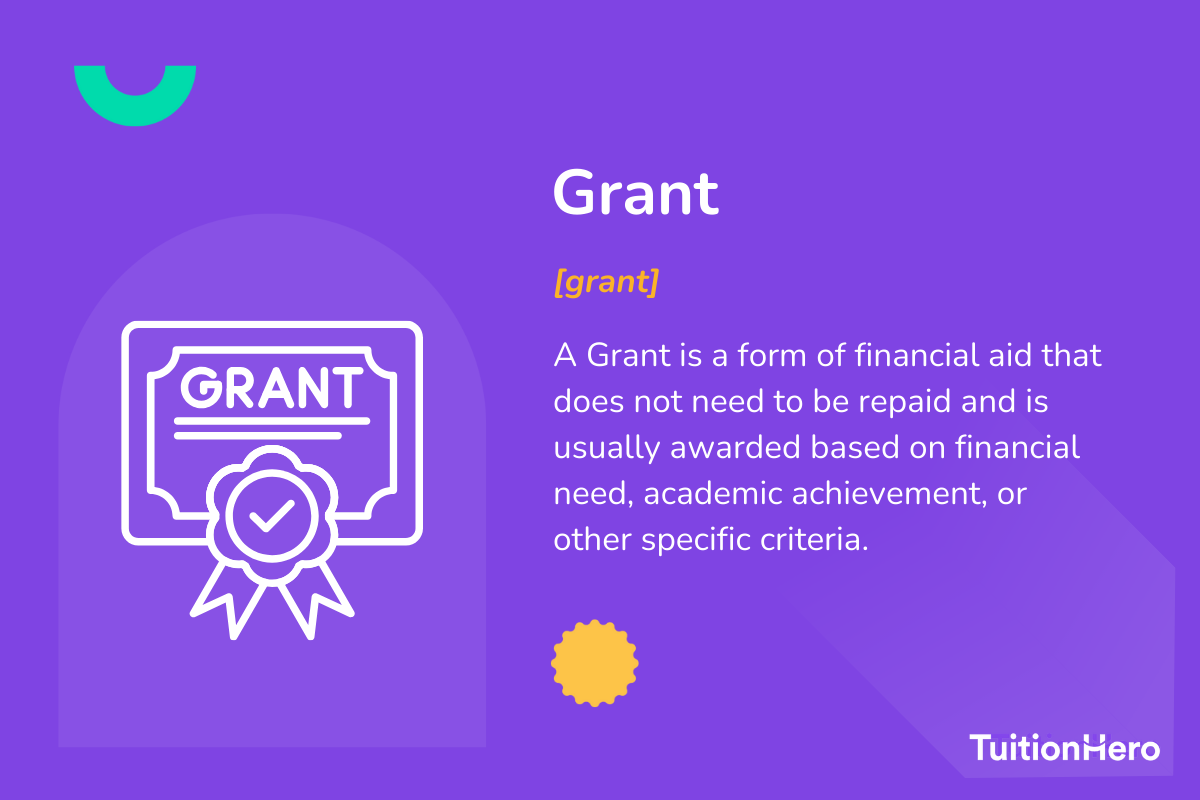Advertiser Disclosure
Last update: November 17, 2024
3 minutes read
What is a Grant?
Ever wondered what a grant is and how it can fund your education? Explore the essentials of grants, eligibility, and application process.

By Derick Rodriguez, Associate Editor
Edited by Yerain Abreu, M.S.
Learn more about our editorial standards



By Derick Rodriguez, Associate Editor
Edited by Yerain Abreu, M.S.
Learn more about our editorial standards
Understanding the difference between loans, scholarships, and grants is important when it comes to paying for college. It's crucial for students and parents to know this so they can figure out how to pay for education without getting into too much debt.
We'll discuss why grants are important for paying for college and how to find and apply for them. You'll learn the basics about grants, what makes them special, and how they're different from other ways of getting money for college.

Key takeaways
- Grants are free money aimed at funding your college education and don’t need to be repaid
- Applying for grants requires early planning, meeting deadlines, and being eligible
- Different sources offer grants based on financial need, academic achievements, or specific talents
What is a grant?
A grant is essentially free money awarded to fund your college education, and it doesn't need to be repaid. Typically, grants are need-based, meaning they are given to students who demonstrate a financial need.
Governments, colleges, universities, and private organizations offer grants. These grants aim to make education more accessible to people who might not otherwise be able to afford it.

Here's a breakdown of important points about grants:
- Source of funding: Grants can come from many sources, including federal and state governments, educational institutions, and private organizations.
- Eligibility criteria: While most grants focus on financial need, some might also consider academic achievement, area of study, or specific talents.
- Application requirements: Many grants, especially those provided by the government, require you to fill out the FAFSA (Free Application for Federal Student Aid).

TuitionHero Tip
Remember, there's no one-size-fits-all way to save for college, and what works for one family might be different for another. Visit TuitionHero.org for personalized advice and tools that suit your unique financial situation.
Grants are different from loans because you don't have to pay them back. This makes them a highly sought-after form of financial aid for students.
Scholarships are like grants, you don't have to pay them back. But scholarships are usually given based on how well you've done in school, not just because you need the money.
Understanding these differences and similarities can help you figure out how to pay for your education. For more insights on dealing with student loans and refinancing, check out how to refinance student loans.
Dos and don'ts of applying for grants
Getting money for college is easier when you know how to apply for grants smartly. Check out this simple list of what to do and what not to do to improve your chances.
Do
Do start your search early to meet deadlines.
Do organize documents and information needed.
Do carefully follow application instructions.
Do tailor your application to align with the grant's goals.
Do express genuine need and how the grant will help your education.
Don't
Don't ignore small grants; they add up.
Don't assume you won't qualify and skip applying.
Don't submit without proofreading for errors.
Don't rely solely on grants; explore other financial aid options.
Don't forget to check your application status and follow up if necessary.
Compare private student loans now
TuitionHero simplifies your student loan decision, with multiple top loans side-by-side.
Compare Rates
Advantages and disadvantages of applying for grants
It's important for students to understand the good and bad sides of applying for grants. Grants give you free money, but there are limits, and lots of other people are trying to get them, so it's important to know all the details.
- Grants don’t need to be repaid, easing financial strain post-graduation.
- They can cover a variety of educational expenses, not just tuition.
- Applying for multiple grants can significantly reduce the cost of education.
- Many different grants are available for all sorts of needs and backgrounds.
- Getting a grant can make your academic or work history look good.
- The application process can be time-consuming and competitive.
- Grant amounts may not cover all education costs, so you might need more funding sources.
- Eligibility criteria can be strict, limiting the pool of potential recipients.
- Grants usually depend on maintaining a certain academic standard or other conditions.
- Grant availability can vary from year to year depending on funding sources, making some years more competitive than others.


Why trust TuitionHero
At TuitionHero, we understand that paying for school can be hard. That's why we offer helpful college finance resources designed to simplify the process for you. We help students and parents find loans and scholarships for school. We also connect you with student-friendly credit cards and guide you through the FAFSA process. If you're worried about paying for school without getting into debt, we can help you manage your college finances better.
Frequently asked questions (FAQ)
It's important to start your grant application process early. Start at least a year before you actually need the money.
Starting early gives you enough time to do your research, collect all the documents you need, and make sure you meet all the application deadlines. Getting a head start on this means you won't miss out on funding opportunities just because you didn't have enough time to apply before the deadline.
Grants can help pay for more than just classes. Some grants can cover books, housing, tools, and even personal things you need for school. Make sure to check what each grant covers so you can plan your finances better.
A good grant application usually shows why you need the money and tells a story that fits with what the grant is for. Showing how the grant will help your education and future plans can really help. Be honest, share your own story, and check your application carefully for mistakes to make sure it's clear and says what you mean.
Final thoughts
It's important to know what a grant is and how it helps pay for education. This is key for students and parents.
Though getting a grant might seem hard, it can really help with college costs. Planning early, doing research, and applying carefully can boost your chances of getting one.
And remember, TuitionHero is here to help with your college finances. Explore our resources and tools designed to simplify the college finance process at scholarships from TuitionHero.
Source
Author

Derick Rodriguez
Derick Rodriguez is a seasoned editor and digital marketing strategist specializing in demystifying college finance. With over half a decade of experience in the digital realm, Derick has honed a unique skill set that bridges the gap between complex financial concepts and accessible, user-friendly communication. His approach is deeply rooted in leveraging personal experiences and insights to illuminate the nuances of college finance, making it more approachable for students and families.
Editor

Yerain Abreu
Yerain Abreu is a Content Strategist with over 7 years of experience. He earned a Master's degree in digital marketing from Zicklin School of Business. He focuses on college finance, a niche carved out of his journey through the complexities of academic finance. These firsthand experiences provide him with a unique perspective, enabling him to create content that's informative and relatable to students and their families grappling with the intricacies of college financing.
At TuitionHero, we're not just passionate about our work - we take immense pride in it. Our dedicated team of writers diligently follows strict editorial standards, ensuring that every piece of content we publish is accurate, current, and highly valuable. We don't just strive for quality; we aim for excellence.
Related posts
While you're at it, here are some other college finance-related blog posts you might be interested in.
Shop and compare student financing options - 100% free!

Always free, always fast
TuitionHero is 100% free to use. Here, you can instantly view and compare multiple top lenders side-by-side.

Won’t affect credit score
Don’t worry – checking your rates with TuitionHero never impacts your credit score!

Safe and secure
We take your information's security seriously. We apply industry best practices to ensure your data is safe.
Finished scrolling? Start saving & find your private student loan rate today





